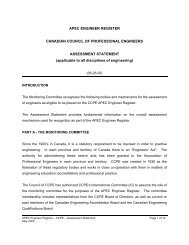Glossary of Terms (pdf) - Washington Accord
Glossary of Terms (pdf) - Washington Accord
Glossary of Terms (pdf) - Washington Accord
Create successful ePaper yourself
Turn your PDF publications into a flip-book with our unique Google optimized e-Paper software.
Critical: used to describe a factor, component, process, issue or decision in an engineering activity<br />
requiring analysis and judgement from which other consequences follow; an entity or operation<br />
that must be successfully implemented or completed to ensure that a more complex operation or<br />
system can function: failure <strong>of</strong> the critical entity or operation compromises the whole.<br />
Depth <strong>of</strong> knowledge: is quantified largely by the specialist engineering sciences in the curriculum.<br />
Design: see Engineering Design<br />
Educational accord: is an agreement that provides benchmarking <strong>of</strong> educational standards and mutual<br />
recognition benefits to individuals who hold qualifications accredited by signatories. See<br />
Pr<strong>of</strong>essional Level Agreement<br />
Educational objectives: a statement <strong>of</strong> the intended achievement that graduates <strong>of</strong> a programme must be<br />
capable <strong>of</strong>, <strong>of</strong>ten with emphasis on the early years after graduation.<br />
Engineer: strict application applies to persons with pr<strong>of</strong>essional, chartered or similar status or engineer<br />
title.<br />
Engineering: (n) an activity that seeks to meet identified needs <strong>of</strong> people and societies by the purposeful<br />
application <strong>of</strong> engineering sciences, technology and techniques to achieve predicted solutions<br />
that use available resources efficiently, are economical, that manage risks; engineering is carried<br />
out by practitioners performing roles differentiated by the level <strong>of</strong> problem analysis and solution,<br />
the activity to be managed, risk and responsibility.<br />
Engineering (a): to do with the activity <strong>of</strong> engineering.<br />
Engineering Activities include but are not limited to: design; planning; investigation and problem<br />
resolution; improvement <strong>of</strong> materials, components, systems or processes; engineering operations<br />
and maintenance; project management; research, development and commercialisation.<br />
Engineering application: a situation in which engineering knowledge, skills and methods are brought<br />
to bear to provide a beneficial result.<br />
Engineering design: is the systematic process <strong>of</strong> conceiving and developing materials, components,<br />
systems and processes to serve useful purposes. Design may be procedural, creative or openended<br />
and requires application <strong>of</strong> engineering sciences, working under constraints, and taking<br />
into account economic, health and safety, social and environmental factors, codes <strong>of</strong> practice and<br />
applicable laws.<br />
Engineering design knowledge: Knowledge that supports engineering design in a practice area,<br />
including codes, standards, processes, empirical information, and knowledge reused from past<br />
designs.<br />
Engineering discipline: synonymous with branch <strong>of</strong> engineering.<br />
Engineering education programme: an educational programme that aims to provide the educational<br />
base toward becoming an engineering pr<strong>of</strong>essional and satisfies criteria prescribed by an<br />
engineering accreditation body.<br />
Engineering fundamentals: a systematic formulation <strong>of</strong> engineering concepts and principles based on<br />
mathematical and basic sciences to support applications.<br />
Engineering graduate: the holder <strong>of</strong> an engineering qualification.<br />
3




